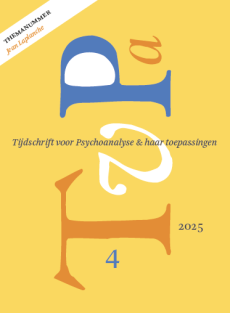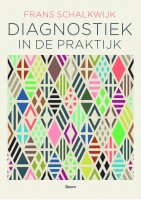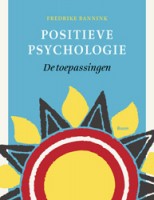De verdubbeling van de wereld
Summary
A double world
Resistance in therapy for second-generation migration-related identity problems
Starting in early childhood, second-generation non-Western immigrants live in a reality of irreconcilable cultures and divided generations and families. The emphasis in this article is on how patients with migration-related identity problems are constantly tossed back and forth internally as well as externally between incongruous worlds, which also occurs in the course of therapy. A fixated pattern like this of a double world is accompanied by numerous secrets, lying and pretending. In the case described here, migration-related identity problems manifest themselves in such a way that the therapeutic setting itself acquires a form that is quite out of the ordinary. With transatlantic psychotherapy twice a week at fixed times on the telephone, continuity and connection are very concretely established. The inner integration increases and therapy comes increasingly to resemble regular psychoanalytical therapy.
Literatuur
- Elias, N. & Scotson, J.L. (2005) [1965]. Gevestigden en buitenstaanders Spanningen en machtsverhoudingen tussen twee arbeidersbuurten. Amsterdam: Boom.
- Fonagy, P. & Target, M. (1996). Playing with reality I. Theory of mind and the normal development of psychic reality. The International Journal of Psycho- Analysis, 77, 17-234.
- Fonagy, P. & Target, M. (2000). Playing with reality III. The persistence of dual psychic reality in borderline patients. The International Journal of Psycho-Analysis, 81, 853-874.
- Gomperts, W.J. (2006). Herkenning en verschil Vijf jaar psychoanalytische therapie bij migranten en vluchtelingen. In: Gomperts, W.J. & Veen, G.I.E. (red.) (2006). Migratie in psychoanalyse Over psychoanalytische behandelingen van migranten en vluchtelingen (p. 30 - 52). Assen: Van Gorcum.
- Green, A. (2001). Life narcissism, death narcissism. Londen: Free Association Books.
- Hebbrecht, M. (2007). De echte en de virtuele divan Enkele psychoanalytische reflecties. Tijdschrift voor Psychoanalyse, 13, 237-240.
- Luymes, M. (2007). Transitional space in cyberspace: de echte en virtuele divan. Tijdschrift voor Psychoanalyse, 13, 224-236.
- Schalkwijk, F. (2006). Dit is psychoanalyse Een inleiding tot de geschiedenis, theorie en praktijk van psychoanalyse. Amsterdam: Boom.
- Target, M. & Fonagy, P. (1996). Playing with reality II. The development of psychic reality from a theoretical perspective. International Journal of Psycho-Analysis, 77, 459-479.
- Target, M. (2007). Breaking the loop: lying and pretending as a resistance to analysis, and to life. Lezing congres International Psychoanalytic Association, Berlijn, juli 2007.
- Zevalkink, J. & Berghout, C.C. (2008). Door de bank genomen Hoe effectief zijn psychoanalytische behandelingen? Amsterdam: Nederlands Psychoanalytisch Instituut.
 © 2009-2026 Uitgeverij Boom Amsterdam
© 2009-2026 Uitgeverij Boom Amsterdam
ISSN 1382-516x
De artikelen uit de (online)tijdschriften van Uitgeverij Boom zijn auteursrechtelijk beschermd. U kunt er natuurlijk uit citeren (voorzien van een bronvermelding) maar voor reproductie in welke vorm dan ook moet toestemming aan de uitgever worden gevraagd:
Behoudens de in of krachtens de Auteurswet van 1912 gestelde uitzonderingen mag niets uit deze uitgave worden verveelvoudigd, opgeslagen in een geautomatiseerd gegevensbestand, of openbaar gemaakt, in enige vorm of op enige wijze, hetzij elektronisch, mechanisch door fotokopieën, opnamen of enig andere manier, zonder voorafgaande schriftelijke toestemming van de uitgever.
Voor zover het maken van kopieën uit deze uitgave is toegestaan op grond van artikelen 16h t/m 16m Auteurswet 1912 jo. Besluit van 27 november 2002, Stb 575, dient men de daarvoor wettelijk verschuldigde vergoeding te voldoen aan de Stichting Reprorecht te Hoofddorp (postbus 3060, 2130 KB, www.reprorecht.nl) of contact op te nemen met de uitgever voor het treffen van een rechtstreekse regeling in de zin van art. 16l, vijfde lid, Auteurswet 1912.
Voor het overnemen van gedeelte(n) uit deze uitgave in bloemlezingen, readers en andere compilatiewerken (artikel 16, Auteurswet 1912) kan men zich wenden tot de Stichting PRO (Stichting Publicatie- en Reproductierechten, postbus 3060, 2130 KB Hoofddorp, www.cedar.nl/pro).
No part of this book may be reproduced in any way whatsoever without the written permission of the publisher.
Nieuwsbrief Boom Psychologie
Meld u nu aan en ontvang maandelijks de Boom Psychologie nieuwsbrief met aantrekkelijke aanbiedingen en de nieuwe uitgaven.
Aanmelden


